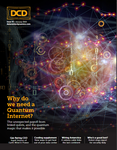It might surprise you to hear that when it comes to public investment in quantum computing, the EU is leading the world. As a region, the EU has committed €7 billion in the last five years, with both the US and China committing $5 billion in the same time period.
Quantum is still in its infancy, and while its applications are very specific, most analysts recognize that the market will continue to grow. We are, however, rapidly moving from the experimental phase into live production systems, from testing quantum emulators to using real quantum computers with capabilities that now reach hundreds of qubits. For example, quantum computers will offer possibilities that are not possible with “traditional” computers in applications such as path optimization or molecular simulation.
The global quantum landscape
However, when we look at some of the major technological developments of the last two decades – AI, social media, even cloud computing – they have a tendency to be dominated by American or Chinese firms. Whether it’s YouTube, Instagram, and TikTok or OpenAI, Anthropic, and Meta's Llama (thankfully, we have Mistral in Europe) – not to mention the hyperscale cloud providers, the innovation ecosystems tend to be clustered in two regions.
The rise of quantum technologies poses a major strategic challenge for modern economies, and Europe is no exception. The region has many leading startups such as Pasqal, IQM, or Alice & Bob, all of which have raised more than €100 million.
It may be surprising to hear that quantum is closely aligned to the cloud. A quantum ecosystem in the cloud is crucial to supporting innovation and developing cutting-edge solutions. European businesses, universities, and research labs need easy and secure access to quantum computing platforms, which can experiment, design new algorithms, and deepen understanding of complex phenomena. This Europe-wide collaboration not only fosters the creation of new knowledge but also strengthens the competitiveness of European players in the face of the major global powers.
The US and China are investing heavily in quantum technologies, both in industry and in fundamental research. For Europe to compete, it is imperative to pool resources and build a secure, high-performance cloud infrastructure dedicated to quantum computing. This includes government support, funding for ambitious research projects, and networking skills across the continent. This strategy will create the right environment for European champions to emerge, innovate, and compete on the global market.
Finally, a quantum ecosystem in Europe’s cloud is an asset for guaranteeing digital sovereignty and protecting sensitive data. Quantum technologies will shake up current security standards, rendering encryption protocols obsolete, and creating new threats. By developing its own quantum capabilities, Europe is maintaining control of its strategic infrastructure, limiting its technological dependence on foreign powers, and ensuring that its economic and scientific interests are protected. This independence is a genuine guarantee of trust for European businesses and citizens, as well as fostering growth and innovation in the digital sector.
How to support quantum
Unfortunately, all of the planning and fair process will be redundant if local players don’t exist. At the moment, they do, but we’re at an inflection point where support is crucial, especially since so many of them are startups. European organisations like Quandela, Alice & Bob, C12, Eviden, Pasqal, and others are all leading the charge into quantum’s bright future.
And thankfully, Europe is taking quantum seriously. There are many initiatives across Europe, from the Quantum Technologies Flagship to the European Quantum Communication Infrastructure Initiative, all designed to help quantum organizations grow.
Unfortunately, Brexit has had an impact on this collaboration; many British universities have highly successful quantum research departments that could contribute valuable material to the development of the local quantum ecosystem. Although there has been valuable research exchanged between the UK and other countries, the UK has been excluded from a number of European quantum programs, and Brexit has hampered physical movement and knowledge sharing more broadly.
However, there is much that can be done. The quantum ecosystem needs support and that means spending. If your company makes a billion pounds, you should be investing a million pounds into quantum – and when possible, you should do it with British or European companies.
Many organizations also have startup incubators or support programs, lending their expertise, their networks (and sometimes, their offices) to growing companies. These programs are invaluable, especially given that many quantum organisations are only a few years old.
Although quantum might seem like science fiction at times, its applications will have very real and tangible business benefits to people and organizations across the globe. It may seem to be too soon and the business cases may be hard to build, but there’s a good chance that if you’re thinking about quantum, your competitors are as well.
We're at the point where we don't know yet whether or not this will succeed, much like Schrodinger’s cat in its box, but one thing is for sure: the path is exciting and will bring great change to our use of IT. Let’s make sure we support it today, creating the future that we want to see tomorrow.





